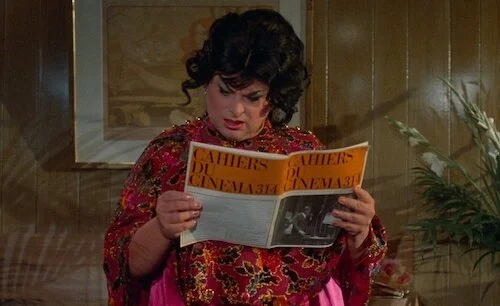Polyester: On-This-Day Thursday
Written by Andreas Babiolakis
Every Thursday, an older film released on this opening weekend years ago will be reviewed. They can be classics, or simply popular films that happened to be released to the world on the same date.
For May 29th, we are going to have a look at Polyester.
Polyester is the obvious bridge in John Waters’ career, between his more commercially appealing works like Hairspray and Cry Baby, and the highly polarizing works that came before (need I say more than Pink Flamingos?). Either way, he always operated via counterculture. He created his own Hollywood with his usual acting troupe known as the Dreamlanders (named after his production company). His visions of working class America were as taboo as they could be, but they always carried enough truth that even his most absurd stunts possessed a sympathetic angle. He really did play by his own rules, even when he finally got around to working on the occasional theatrical successes. If there was ever a way for John Waters to test the proverbial waters of mainstream cinema (before he took this plunge), it was Polyester: possibly his greatest achievement.
Waters not only enjoyed cinema, but the niches surrounding movie going experiences as well. Out of the many gimmicks he has expressed enjoyment for, the one he attached to Polyester was “Odorama”: a scratch-and-sniff card where audiences can feel like they are a part of the picture. Things seem lovely during the test of this experiment (a nice scent of roses), but you know things will take a huge nosedive when the first actual scent is a rancid fart; having to deal with body odour and skunks is confirmation of this. Luckily, the smelling aspect is hardly important, and is used by Waters as a hilarious punchline that leaves audiences concerned about taking part the next time a number pops up on screen. When you get rewarded with a nice pizza aroma, then you don’t know where you stand, and that’s half the fun.
Polyester depicts a hideous underbelly of American suburbia in Waters own twisted way.
All of this madness (and the questionable smells that follow it) surrounds housewife Francine (played by Divine), who is facing what feels like the worst time of her life. The amount of problems, rebellions, and disasters that Francine endures is beyond pugnacious, and Divine’s hysterical responses only make each falling domino feel all the funnier. It almost feels sick to say, but I find Polyester to be one of the most hilarious films of all time, and I sincerely mean this. Everything in the film points towards an everyday person trying to cling on for dear life while their world around them crashes, but it’s Waters’ cherries-on-top that always push the boundaries too far to the point of uncomfortable laughter. Without spoiling, the insanely dark joke surrounding the family dog was so morbid but goofily staged that it remains the only time I have ever actually fallen out of my seat during a film.
Underneath Waters’ bonkers comedy is a series of painful truths. Many working Americans do live in the shadows of the supposed dream that actually shuns them all. Waters has always given voices to the misrepresented citizens of the United States, and Polyester is no different. If anything, the final act side steps away from crazy humour, and strolls toward a surreal fantasy that feels much more tender. This is meant to be the final form of escapism that many viewers needed: away from the flatulence, the discomfort, and the shrieks is a resolution that feels impossible, and yet here it is. Waters gave it to Francine, but he was also giving it to us as well. Otherwise, you see the America that Waters sees: a country that tells women what to do with their bodies, what to believe, and that lives only matter when they help money circulate.
John Waters’ cinematic expertise plays into his breaking of molds.
Even though Polyester feels almost anarchistic (and that’s nothing compared to his earlier works), I find that these off-the-rails narratives (especially with how they are shot) are indicative of his cinematic expertise. He has forever vowed to capture that very particular sensation, where a motion picture affects you to the point of having a clear memory remain forever in your core. Philosopher Roland Barthes called this type of phenomena “punctum” (compared to “studium”, which is the surface level acknowledgement of a work’s cultural and historical significance), and it’s something Waters chased film after film. Polyester was the one time he was able to pull this off with many different kinds of audiences: the thrill seekers, the counter-artists, the societal dreamers and the safe players. It’s still very much a John Waters production: camp and all. However, there is a wide scope that Polyester has via its commentary and its cinematic execution. It is as funny as it is cynical, as tough as it is light, and as real as it is clearly a creative depiction. If something this deceptively profound comes with a card that smells like gasoline, then I’ll take it.
Andreas Babiolakis has a Masters degree in Film and Photography Preservation and Collections Management from Ryerson University, as well as a Bachelors degree in Cinema Studies from York University. His favourite times of year are the Criterion Collection flash sales and the annual Toronto International Film Festival.








